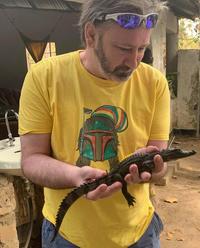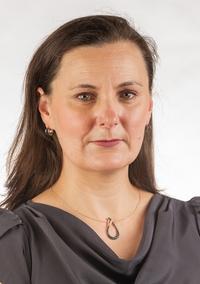Organisers
Local organising committee

Senior Researcher at the University of Oxford and Departmental Lecturer in Microbiology and Infectious diseases. Fran's work on Campylobacter infection and effective intervention strategies has helped support ‘on-farm’ biosecurity measures. Her work has also demonstrated that, contrary to popular belief, wild birds are not a major source of contamination for broiler chicken flocks. Current research forms part of a multidisciplinary approach using state of the art technology to formally test links between chicken flock behaviour, welfare and Campylobacter prevalence, and to explore good husbandry as a potential measure to reduce colonisation of chicken flocks by Campylobacter, and ultimately to reduce the incidence of human disease.
Amy is a Lead Epidemiologist in gastrointestinal infections at the UK Health Security Agency and currently working towards her DPhil on the epidemiology of Campylobacter in the UK at the University of Oxford.
Amy Douglas | UKHSA | ORCiD

Madison is a DPhil student in Biology at the Ineos Oxford Institute and the Department of Biology, University of Oxford. Her research focuses on the (meta)genomics of Campylobacter in low- and middle-income countries, with a particular interest in source attribution and the distribution of antimicrobial resistance genes. Before joining the Sheppard Lab in Oxford, Madison worked with Dr. Kerry Cooper at the University of Arizona, where she studied bacterial diversity on fresh produce surfaces. She holds a degree in Microbiology and Food Safety and is passionate about the intersection of microbial communities, environmental change, and global health.
Madison Goforth | Ineos Oxford Institute for Antimicrobial Research | Scholar | ORCiD

Professor Martin Maiden has more than thirty years of experience in the NHS and academia, translating high-quality basic science into practical public health benefits, especially in bacterial vaccines, vaccination, and food safety. This has included leading/participating in large national and international studies to understand the impact of vaccines and the development of widely-adopted approaches and bioinformatics platforms for exploiting sequence-based and genomic data. He also has more than fifteen years’ experience as an undergraduate and graduate educator and in advanced training for health professionals and capacity building, especially in Europe and Africa.
After earning a microbiology degree at Reading and completing a PhD in Cambridge, Martin pioneered molecular and evolutionary approaches to studying bacterial pathogens. His work has been instrumental in the development of multilocus sequence typing (MLST), advancing the understanding of meningococcal and Campylobacter epidemiology. Martin co-developed the widely used PubMLST.org platform, facilitating large-scale bacterial genome analysis, and has directly influenced vaccine strategies, including meningococcal conjugate vaccines. Through international collaborations and training initiatives, he continues to apply genomic and evolutionary insights to combat infectious diseases globally.
Professor Martin Maiden | Department of Biology | Scholar | ORCiD

Senior Research Fellow at the Ineos Oxford Institute for Antimicrobial Research, University of Oxford. Research delves into the global differences in Campylobacter and the emergence of multi-drug resistant Campylobacter coli. With over a decade of pioneering work on the epidemiology of enteric pathogens, Ben leverages a systems biology approach incorporating comparative microbial genomics to unravel the complexities of disease transmission, survival, and virulence. Previously managing laboratory operations at the Centre for Genomic Pathogen Surveillance, Ben has contributed to cutting-edge research spanning five continents. His career includes previous postdoctoral roles at the University of Bath and Swansea University Medical School, contributing significantly to the fields of microbial genomics and bioinformatics.
Dr Ben Pascoe | Ineos Oxford Institute for Antimicrobial Research | Scholar | ORCiD

Professor of Microbial Genomics and Evolution at the University of Oxford, focusing on bacterial pathogens and antimicrobial resistance. Tutorial Fellow at St. Anne’s College and Editor-in-Chief of Microbial Genomics. Sam’s research explores the evolution, ecology, and epidemiology of bacterial pathogens, with a focus on antimicrobial resistance. His group uses genomics and bioinformatics to study how bacteria adapt, spread, and evolve resistance in diverse environments.
Key areas of focus include:
Genome Evolution – Unravelling genetic changes that drive virulence and resistance.
Ecological Genomics – Tracking pathogen transmission across hosts, food, and the environment.
Global Health – Developing genomic surveillance, vaccines, and innovative pathogen control strategies.
By integrating genomics with real-world applications, Sam’s work informs public health interventions and antimicrobial resistance management globally.
Professor Samuel Sheppard | Ineos Oxford Institute for Antimicrobial Research | Scholar | ORCiD
Scientific advisory committee

Associate Professor in foodborne enteric pathogens at the London School of Hygiene and Tropical Medicine. Ozan leads the foodborne enteric pathogen group at the LSHTM where he studies the physiology and pathogenesis of Campylobacter and other related enteric microorganisms (e.g. Listeria spp. and Vibrio spp.). His work is Important in translating fundamental microbiological knowledge to real life settings by implementing intervention and control strategies. His group uses classical molecular microbiology techniques, and links bioinformatic skills to apply cutting-edge omics based approaches e.g. genomics, transcriptomics and metagenomics to answer relevant research questions.

Nicol is an epidemiologist and microbiologist specialising in foodborne zoonoses and their transmission across ecological compartments. Currently a Career Track Group Leader at the Quadram Institute, she investigates the epidemiology and genomics of Campylobacter in the food chain using innovative surveillance and analytical approaches.
With a background in public health at the Public Health Agency of Canada, she has contributed to integrated surveillance programs such as CIPARS and FoodNet Canada, translating scientific research into policy-relevant insights. She is an elected member of the Advisory Committee on the Microbiological Safety of Food. Her academic work spans antimicrobial resistance in wildlife, food, and the environment, combining epidemiology, microbiology, and genomics to inform food safety and public health strategies.
Dr Nicol Janecko | Quadram Institute | ORCiD
Senior Public Health Microbiologist at the UK Health Security Agency.

Noel McCarthy is Professor of Population Health Medicine at Trinity College Dublin. His background is as a public health doctor with a particular interest in applying diverse approaches to understanding factors that affect public health, be that housing, drug use, or indeed Campylobacter.
Professor Noel McCarthy | Trinity College Dublin | Scholar | ORCiD

John Rodgers is the lead for Field Epidemiology and Surveillance workgroup within the Department of Bacteriology at the Animal and Plant Health Agency (APHA).
John leads the UK National Reference Laboratory for Campylobacter in animals. Interests include the epidemiology and ecology of Campylobacter in food-producing animals, in particular poultry. National monitoring of antimicrobial resistance in Campylobacter and Enterococci and surveillance and research in foodborne bacterial zoonoses is carried out.
John Rodgers | APHA | Scholar | ORCiD

Lecturer of Microbiology at the University of Reading in the School of Biological Sciences. Aidan’s research focusses on the molecular physiology of Campylobacter jejuni, with a particular interest in nutrient acquisition and regulation. Research specialities include continuous culture and comparative transcriptomics.
Aidan is a frequent collaborator with the Oxford groups, harnessing the cross-disciplinary approach of bioinformatics and wet lab work to achieve transformative outcomes.
Aidan is a recent recipient of the Academy of Medical Sciences Springboard award, in collaboration with the Grant group at Cambridge, and is the Admissions Tutor for Microbiology programs at Reading.
Aidan Taylor | University of Reading | Scholar | ORCiD



